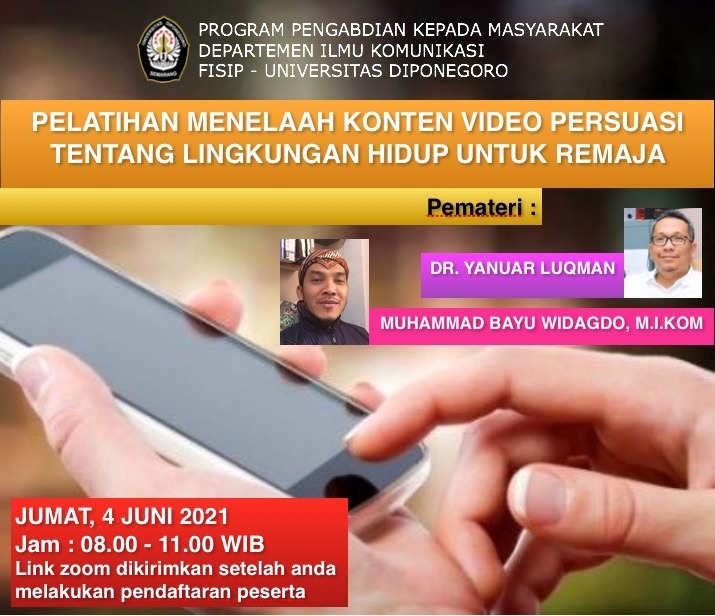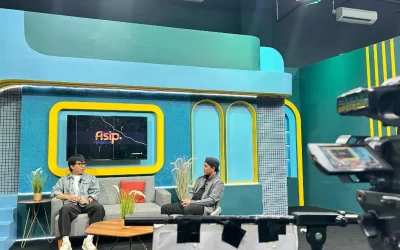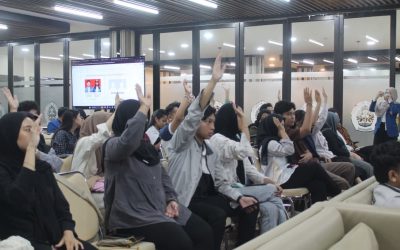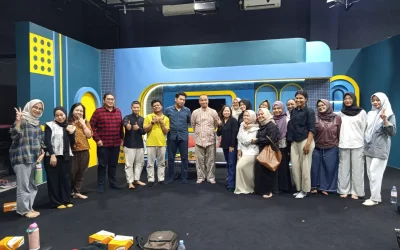The webinar poster entitled “A Study of Environmental Persuasive Video Content for Teenagers” by the Diponegoro University Communication Studies Community Service Program. (Private photo).
SEMARANG – The Diponegoro University Communications Community Service Program successfully held a webinar entitled “Review of Persuasive Video Content About the Environment for Teenagers”, last Friday, 4/6/2021. This webinar presents Dr. Yanuar Luqman and Muhammad Bayu Widagdo, M.I.Kom, both of whom are lecturers in Communication Studies at Diponegoro University.
The discussion which lasted approximately 3 hours and was attended by 80 participants discussed the environment and video content as a form of persuasion. Divided into two sessions, this webinar not only shares technical issues but also enlightens on environmental issues that must be a concern for mankind, especially young people.
Windows Multimedia Environment
In the first session, Dr. Yanuar Luqman stated that Generation Z tends to care about the environment, especially the climate crisis. Yanuar also brought the name of Gretta Thunberg, a young woman from the United States who is fierce in voicing the issue of the climate crisis as a role model.
“According to research, respondents from Generation Z place climate change as a vital environmental issue, followed by pollution, and lastly,” said Yanuar.
Yanuar also reviewed how the environment in Indonesia has complex problems. Environmental problems are also presented by the government itself in terms of natural exploitation for certain interests.
“Must be aware that there are many environmental problems; climate crisis, pollution, poor living standards, as an analogy of a window where the government has more power to exploit nature for their interests,” explained Yanuar.
Towards the end of the session, Yanuar emphasized the role of persuasion and literacy to be vital for this issue. Persuasion is the best and most appropriate approach to building awareness. “It should be underlined, the context that must be built is awareness,” he explained.
As for literacy, the supervision of environmentally literate people can understand and monitor the health system and take appropriate action. It will also affix a sense of optimism and another potential to question environmental issues.
“This is our face, our current situation, the situation outside of our friends who may not know as well as the potential and optimism that can be achieved from environmental problems,” he added.
Yanuar closed by stating that literacy and persuasion are quite effective through video content and the like. “Videos or films can be used as material because they have an environmental theme, namely Silence and Listen (documentaries during a pandemic),” he concluded.
Investigating Video Content
Following the title of the webinar, the session which was filled by Muhammad Bayu Widagdo, M.I.Kom studied how to examine video content, especially in the environmental theme. In his initial presentation, Bayu said that there is a need to be careful in consuming videos, Bayu also knows that content is more selective in choosing content.
“People learn camera management, videography, need special training to take an object. Thus, caution is also needed in watching video content. Must be more selective in choosing and determining the content to watch,” he said.
In creating environmental content, Bayu vitalizes mature concepts, data validity, solid arguments, and well-wrapped message distribution.
“Suitably, the important and interesting aspects of the concept, then based on the latest valid data, strong arguments, and attractively communicated message packaging,” he said.
Bayu added that attention to this vital aspect will make environmental-themed content dim, maybe even inferior to useless content.
“Lack of knowledge about data, issues, packaging of ideas, good production skills, and unattractive ways of communicating will only make environmental-themed videos less responsive,” he added.
With the rapid development of technology and the emergence of a pandemic, the increase in digital goods is close to daily life, Bayu hopes that technology can be a mouthpiece to spread the environment to create the environment, especially to teenagers.
“Now, technology is getting closer to everyday life. The hope is that teenagers have challenges to the environment and are aware that they can convey to other friends that they have been given technological conveniences,” he said.
This webinar does not stop here. The next service session of the Department of Communication Science is planned for next October which will discuss the next theme, namely Environmental Persuasion Video Content Production.
Writer : Lutfi Maulana Adhari
Reporter : Kartika Conny Brilliant Dwikananda
Editor : Dian Rahma Fika Alnina





0 Comments